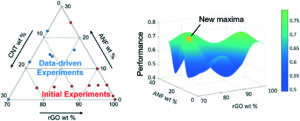It is our great pleasure to announce Professor Jodie Lutkenhaus (Texas A&M University, USA, and member of the MSDE Advisory Board) as the winner of the 2019 Molecular Systems Design & Engineering (MSDE) Outstanding Early-Career Paper Award.
This is in recognition of her leadership of the paper:
Design of multifunctional supercapacitor electrodes using an informatics approach
by Anish G. Patel, Luke Johnson, Raymundo Arroyave and Jodie L. Lutkenhaus
Mol. Syst. Des. Eng., 2019, 4, 654-663
DOI: 10.1039/C8ME00060C
Part of the MSDE themed collection of papers on Soft Materials Nanoarchitectonics
This paper is free to access until 31 December 2020.
Please join us in congratulating Professor Lutkenhaus!
You can read more about this research project on the Texas A&M University website.
Jodie L. Lutkenhaus is the Axalta Coating Systems Chair and Professor in the Artie McFerrin Department of Chemical Engineering at Texas A&M University. Lutkenhaus received her B.S. in 2002 from the University of Texas at Austin and her Ph.D. in 2007 from Massachusetts Institute of Technology. Lutkenhaus then studied as a post-doctoral researcher at The University of Massachusetts Amherst. Current research areas include polyelectrolyte complexes, redox-active polymers, sensors and energy storage. She has been recognized as a World Economic Forum Young Scientist and a Kavli Fellow. Lutkenhaus is the Deputy Editor of ACS Applied Polymer Materials and a member of the Board on Chemical Science and Technology of the U.S. National Academies.
An interview with Professor Lutkenhaus
Can you briefly summarise this paper?
This paper examines the selection and the design of supercapacitor electrodes for application in structural energy and power. The goal is to design supercapacitors that are both electrochemically superior and mechanically robust. The challenge is that these two properties are often at odds with each other and the route to maximizing both is not immediately clear. Therefore, informatics was employed to tease out which composition would provide the best combination of these properties specific to electrodes containing reduced graphene oxide, aramid nanofibers and carbon nanotubes. From there, we were able to understand why these materials interplay among each other in terms of energy storage and mechanical properties.
This project was a new experience for me because it was a first result of our participation in our university’s NSF-sponsored Data-Enabled Discovery and Design of Energy Materials program, which blends the concepts of materials with data science. As a result, we teamed up with Professor Raymundo Arroyave to apply data science to an AFOSR-sponsored project out of our lab. I think it is a great example of what results when scientists and researchers step outside of their comfort zone.
What aspect of your work are you most excited about at the moment?
In the structural energy and power area, I am most excited about transitioning what we’ve learned regarding capacitors into the batteries space. I anticipate that structural batteries will be an important part of future electric vehicles, aircraft and spacecraft in which mass and volume are at a premium.
Where do you see the field of materials informatics in five years?
I have been very excited about the emergence of materials informatics applied to soft matter, which at one point seemed like an impossible feat. Polymers are difficult to describe in the informatics-space because their structure and properties depend on processing history, because a single polymer identity can range from being amorphous to crystalline and because of the possibility of entanglements. Recent work on polymer materials informatics in the last two years has paved the path forward and I am eager to adopt this concept for my own lab’s experimental efforts.
How do you feel about Molecular Systems Design & Engineering as a place to publish research on this topic?
Molecular Systems Design & Engineering is a great venue for materials informatics and design research because the editors and the reviewers understand and appreciate this emerging field. In other venues, it can be harder to publish because the cross-disciplinary effort may not be holistically considered. I also appreciate that Molecular Systems Design & Engineering is building and defining this emerging community through its engagement with researchers.
How do you like to spend your time when not doing research?
To unwind, I like to play board games and video games with our two kids. I am also a big music nerd, so I like to continually follow what is new and coming out. With our “new normal” due to COVID-19, I have especially enjoyed all of the time our family has together.
Can you share one piece of career-related advice or wisdom for those beginning their research career?
I encourage early career researchers to become actively engaged in a few select organizations within their research communities. This will promote organic networking, while getting your name out into the world. I think it is also healthy to become involved with organizations outside of your home organization so that you can round-out your support network. For me, I became involved in the American Chemical Society Polymer Materials: Science & Engineering Division and the American Institute of Chemical Engineers Materials Science & Engineering Division, and I have found it to be very rewarding.
About the award
The aim of the MSDE Outstanding Early-Career Paper Award is to recognise a researcher in the earlier stages of their research career for their leadership in reporting original research published in MSDE.
The journal Editorial Board award this prize annually, selecting the paper which they find to demonstrate the highest quality of research, as well as importance to the advancement of the field of molecular engineering, out of all qualifying papers published in the journal each year.
Previous winners:
- 2018: Andrew Ferguson, University of Chicago, USA (link to paper)
Eligibility
In order to be eligible for this award, the candidate must:
- Be listed as a corresponding author on the paper
- Currently be an independent research leader
- Have either a) received their PhD on or after 1st January of the year 12 years prior to the award year (2007 for prize year 2019) or b) spent no more than an equivalent amount of time in research when taking into account any career breaks.
- Not be a previous winner of this award
Selection Process
In order to choose the winner of the 2019 MSDE Outstanding Early-Career Paper Award, a shortlist of articles that were published throughout the year were selected by the editorial office and then subsequently assessed by the journal’s Editorial Board members. The winner was selected based upon the significance, impact and quality of the research.
Prize
The winner of the MSDE Outstanding Early-Career Paper Award will receive an engraved plaque and a travel bursary of £500 to use towards a meeting (or meetings) of their choice.
To have your paper considered for the 2020 MSDE Outstanding Early-Career Paper Award, indicate when prompted upon submission of your revised manuscript if a corresponding author of the paper fulfils these criteria. Multiple eligible authors of a winning paper will share the prize fund equally. You can contact the editors at molecularengineering-rsc@rsc.org if you have any queries.











